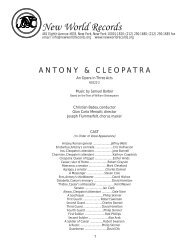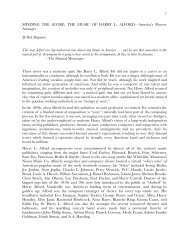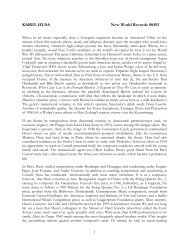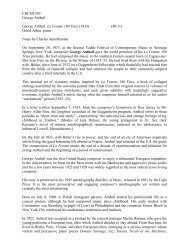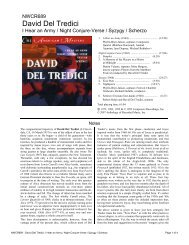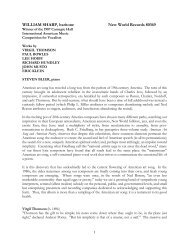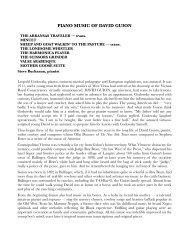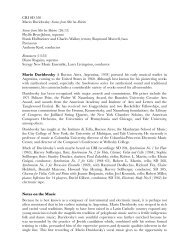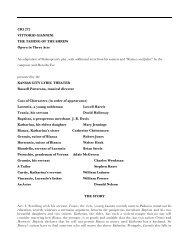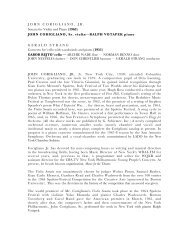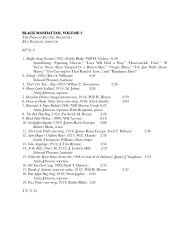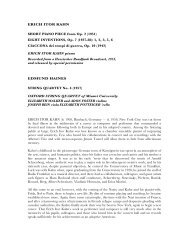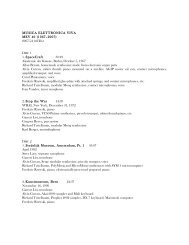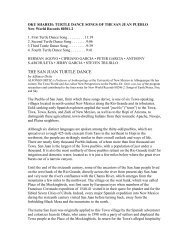Brother, Can You Spare a Dime? - New World Records
Brother, Can You Spare a Dime? - New World Records
Brother, Can You Spare a Dime? - New World Records
Create successful ePaper yourself
Turn your PDF publications into a flip-book with our unique Google optimized e-Paper software.
The Hoover administration chose to regard the situation as merely another in a long<br />
series of recessions, and the President announced in March, 1930, that “all evidences<br />
indicate that the worst effects of the crash upon employment will have been passed<br />
during the next sixty days.” But unemployment climbed at a precipitous rate, and by<br />
early 1932 some twelve million Americans were out of work—twenty-four percent of the<br />
work force. Breadlines appeared in American cities by 1930 as people lined up for free<br />
food doled out by city and state administrations. Apple vendors, many of them until<br />
recently men of affluence, appeared on the streets of <strong>New</strong> York the same year. In 1932<br />
the report of the Emergency Conference on Unemployment in <strong>New</strong> York stated:<br />
Here on the starving front families are breaking up and homes are being destroyed.<br />
More than 20,000 children have passed into institutions and boarding houses because<br />
parents cannot provide for them. . . . The depression has swallowed up working girls<br />
and is now reaching teachers, college graduates, and trained office workers who have<br />
been accustomed to good incomes and comfortable homes.<br />
More than twenty-three hundred banks had failed by 1931, each failure stripping citizens<br />
of savings and other assets. Corporate profits, which had been more than nine billion<br />
dollars (before taxes) in 1929, had totally vanished; there was, instead, corporate loss of<br />
over three billion in 1932. Automobile production had declined sixty-five percent in the<br />
same period, iron and steel output fifty-nine percent, shipbuilding fifty-three percent,<br />
furniture manufacture fifty-six percent. Despite all this, the federal government<br />
steadfastly refused to give relief directly to individuals; the only relief measure enacted,<br />
the Reconstruction Finance Corporation Bill of 1932, made loans to banks, railroads, and<br />
industry. Congressman Hamilton Fish, Jr., of <strong>New</strong> York was widely quoted as saying, “If<br />
we don’t give it [relief to millions of Americans] under the existing system, the people<br />
will change the system. Make no mistake about that.”<br />
When the Depression began, the popular-music industry of white urban America was<br />
large, prosperous, and dedicated to the proposition that Americans turned to song for<br />
amusement, entertainment, and escape.<br />
This had not always been true. For over half a century after the Hutchinson Family came<br />
down from the mountains of <strong>New</strong> Hampshire in the early eighteen-forties proclaiming<br />
themselves “more social reformers than entertainers” and Henry Russell began writing<br />
and singing songs dramatizing the evils of alcohol and slavery, American popular song<br />
had concerned itself with social and political matters. The events leading up to the Civil<br />
War, and the war itself, were the subjects of a majority of the songs written in the fifties<br />
and sixties. There was some return to simple lyricism and personal emotions after the<br />
war, but songs still dealt with alcohol, child labor, and the like.



